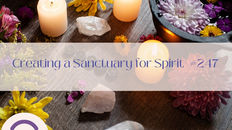"Which school of Reiki should I study?"
- Christina Wooten

- Feb 5, 2020
- 4 min read
Updated: Dec 30, 2020

Getting clear answers about Reiki can be difficult when you aren't sure what to ask or what are reputable sources of information. There are also so many differing schools of Reiki and practitioners who have integrated Reiki in such diverse ways; it is hard to discern where to begin. I remember having these questions when I began my Reiki journey over 13 years ago, and now it is even more confusing for the uninitiated!
The word Reiki has not been trademarked, despite attempts. Overall this is positive, since Reiki (the energy) isn't owned exclusively by one person. However, like many things this upside has a downside. The downside in this case is that there are no specific requirements one must adhere to to start a new branch of Reiki. There are many lineages of Reiki training with a variety of inception stories to justify the off shoots. This underlines how important it is to find a reputable Reiki class and Reiki Master Teacher who you resonate with.
There is Usui/Tibetan Reiki, Holy Fire Reiki, Karuna Reiki, Lightarian Reiki, Rainbow Reiki, and so much more. So what are the differences? Where to start?
The story of Reiki begins with Mikao Usui, the founder of the Usui Reiki system of Natural Healing. He lived in Japan and received the enlightenment of Reiki, spontaneously on Mt. Kurama. He realized that his healing abilities had greatly improved. He began treating those in need for free and rather than “keep” the energy to himself he began training others in the nature of Reiki and how to use it for spiritual growth and healing of self and others. He opened the energy connection within others so they could begin using the energy themselves through a process called Reiki attunement (which is what you receive in a Reiki class). This passing on from Sensei (Reiki Master-Teacher) to student creates a lineage of Reiki.
Naturally, each lineage has some variation. This is to be expected as each teacher has their own relationship with Reiki which influences how they teach and share about Reiki. In each school or lineage of Reiki there is a standard of what should be included in each level.
The closest form of traditional Reiki transmitted from Japan to the West, is the Usui/Tibetan Reiki lineage. Usui/Tibetan Reiki has four levels of training: Reiki 1, Reiki 2, Reiki Master, and Reiki Master-Teacher. At any of these levels, one may practice Reiki for self and others, although professional practitioners generally wait until having completed Reiki Master certification. Usui/Tibetan training focuses on the origins of Reiki, time-honored techniques for all situations, and emphasizes spiritual maturity and development with Reiki.
The other schools of Reiki have their own inception stories that diverge from traditional Reiki techniques and origins. Since Reiki has not been trademarked, some teachers add their own spin to things and then call it ____________Reiki. Holy Fire Reiki, for example, emerged when an Usui/Tibetan trained Reiki Master Teacher (William Rand) was having surgery and was not able to perform the traditional attunement procedures required in a traditional Reiki class. He developed his own attunement procedures which involve religious icons (which are not traditional or necessary in Reiki). Since then, new techniques have been added and a new Western school of Reiki is born.
Does this mean that other versions of Reiki are bad? No, that is not what I am saying. Only that it is different. Just like all things, it has its place in the world. But it is important to listen to your guidance and also your priorities.
Many schools of Reiki are relatively new in comparison to the Usui/Tibetan lineage. Holy Fire Reiki is only a few years old. (Karuna Reiki was another branch created before Holy Fire Reiki by the same teacher). The age and consistancy of Usui/Tibetan Reiki is an asset. Clinical settings are much more used to Usui Reiki and is also often the lineage of Reiki that has been studied in clinical trials.
While many may attend a new type of Reiki class and find benefit, it certainly diverges from the Japanese origins of Reiki. The risk, of course, is that over time, with each new school of Reiki, more of the original teachings of Usui Sensei will be lost as well as healing techniques.
Most importantly, ask the Spirit of Reiki to guide you. Ask to be guided to the right school/lineage of Reiki for you and also to the perfect teacher for you. Then trust your inner guidance!
When I found my Reiki Sensei, I could feel it. I was planning on taking an Usui/Tibetan Reiki 1 class with a friend. We were huddled together exploring website after website. There were so many things to admire about each of them, but something said 'keep searching'. I was on a Reiki directory in North Carolina and was several pages in, when my friend abruptly gets up and says “I picked up a business card for someone, let me see if I can find it.” She ran downstairs. I move on to page 5 of the online directory and stopped on one website about 5 people deep. I could feel that this was the connection that I was supposed to explore. About that moment, my friend emerges with the business card in hand and lo and behold it was the woman who's website I was frozen on. Isn't Reiki wonderful? I realize now that it was guiding me even before my first class!
Of course, my mind was yelling, 'hey it is in another state, wouldn't it be sooooo much more convenient to just take another class in my own city'. And yes, it would have been more convenient, but it wouldn't have been right for me. The driving a couple of hours to class each meeting was exactly what I needed to digest what I had learned! The classes were also held in nature and a bit off the grid, which was just magical. It was 'me' all the way.
Keep exploring, asking questions, and listen to your heart, it knows the way! Christina Wooten is a Certified Reiki Master-Teacher of the Usui/Tibetan lineage of Reiki. She is a full time Reiki practitioner in Sedona, Arizona and teaches all levels of Usui/Tibetan Reiki. Learn more about upcoming class dates and curriculum here











































Comments